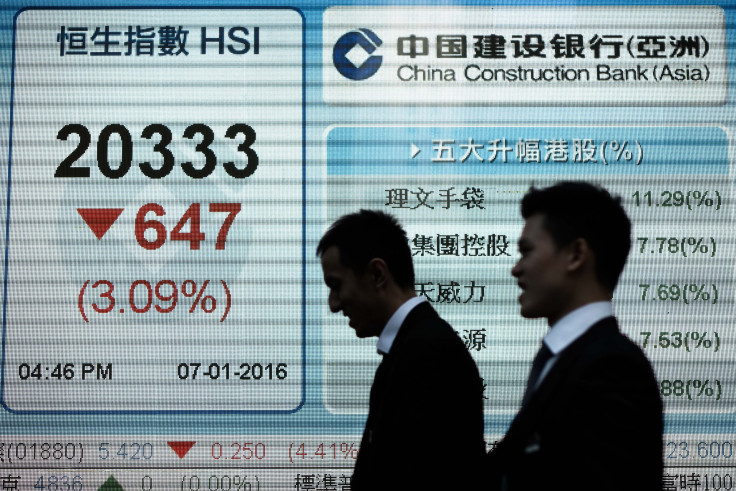China’s Stock Market Drop Highlights Consequences Of An Uncertain Currency Policy

In global currency markets, a government gets stability for its money when its strategy is clear and credible. And right now, China’s is neither, highlighting investors' worries that Beijing’s uncertain policies about the renminbi's exchange rate will continue to roil equity markets for the foreseeable future.
Thursday brought a vivid demonstration of how jittery investors are about Chinese monetary policy when the Shanghai stock exchange tripped emergency circuit breakers after a mere 15 minutes of trading, and closed for the day a short time after.
The renminbi’s rate to the dollar also fell for the fourth straight day, the largest daily slide since an August devaluation that woke global equity markets up to the prospect of extended pressure on the Chinese currency.
More concretely, the People’s Bank of China, the country’s central bank, reported that its foreign exchange reserves fell by $108 billion over the past month, bringing them below the $3.3 trillion mark and declining at a faster pace than in the previous month. That indicates the central bank is, for all intents and purposes, defending the currency from ever-greater pressure to fall further.
Chinese authorities haven’t figured a way out of the quandary of using their foreign exchange reserves — and risking a significant cut to their war chest — or letting the currency fall to a point where investors other than the central bank are willing to buy. But the bank doesn’t know precisely what that rate is, nor can it have confidence that markets would not overshoot its new target.
For now, Beijing’s intentions — and the extent of its financial policymaking talents — are murkier than ever.
“Either [the Chinese authorities] know what they are doing, and the rest of the world doesn’t get it,” said one close observer of Chinese policy. “Or they are making it up.”
The reaction of equity markets demonstrates how currency issues bleed into other areas of policy.
China’s stock market is a largely closed affair, with the major players being large domestic companies and wealthy citizens, not foreign speculators and investors. To the extent that those big players are taking money out of China to diversify their copious savings — and the dollar outflows suggest they definitely are — then they will put less cash into equities.
Chinese authorities have sought to relieve pressure on equity markets through other measures, notably share purchases by national champions, such as major banks. On Thursday, Chinese securities regulators published new rules restricting share sales by large holders and by corporate officers and directors.
Bill Witherell, chief global economist at Cumberland Advisors, an asset manager, said the interventions reflect the “manipulated nature” of current prices on Chinese equity markets. “Market-clearing prices could be considerably lower,” he added.
The equity selloff also highlights the institutional challenges China faces in managing interconnected markets that are supervised by different government agencies.
The Peoples Bank of China handles exchange rate matters. Stock markets are supervised by the China Securities Regulatory Commission, which has approached the market in fits and starts since August. Its approach bears the institutional onus of managing a problem not entirely under its own control.
“The PBoC doesn’t want to get its feet wet in the stock market because it is so chaotic and the rules keep changing so much,” Chen Long, China economist at Gavekal Dragonomics, told the Financial Times. “The PBoC is happy to stay away from it and let the CSRC play the role of the clown.”
© Copyright IBTimes 2024. All rights reserved.





















